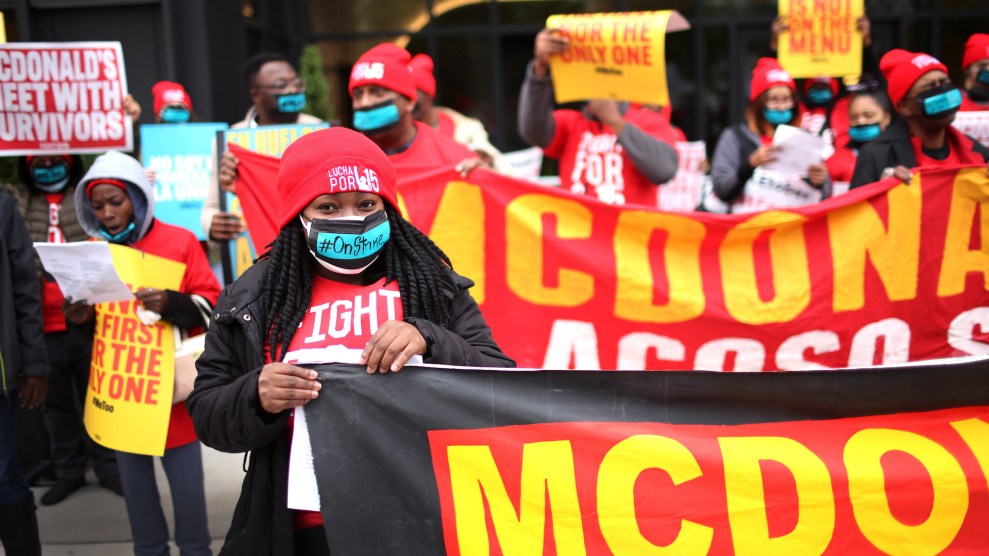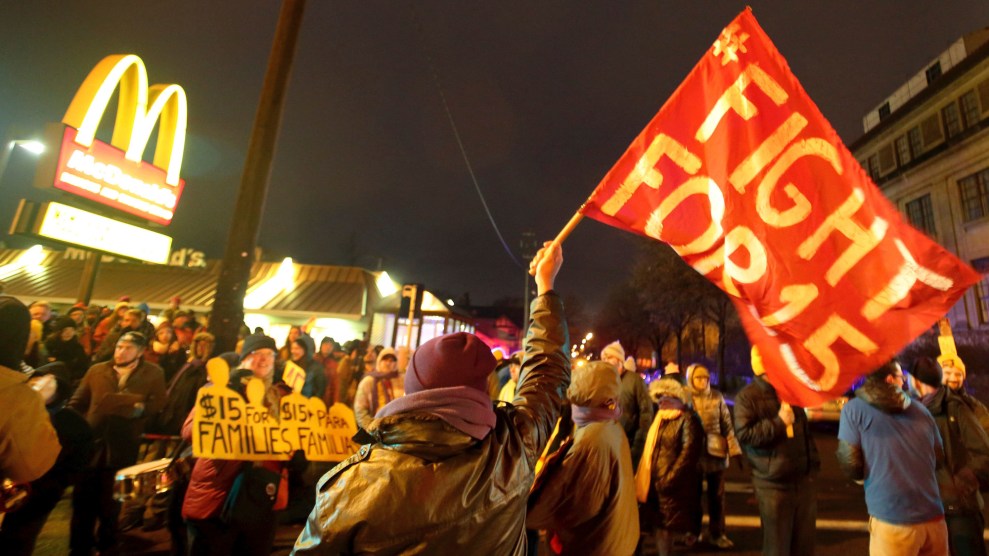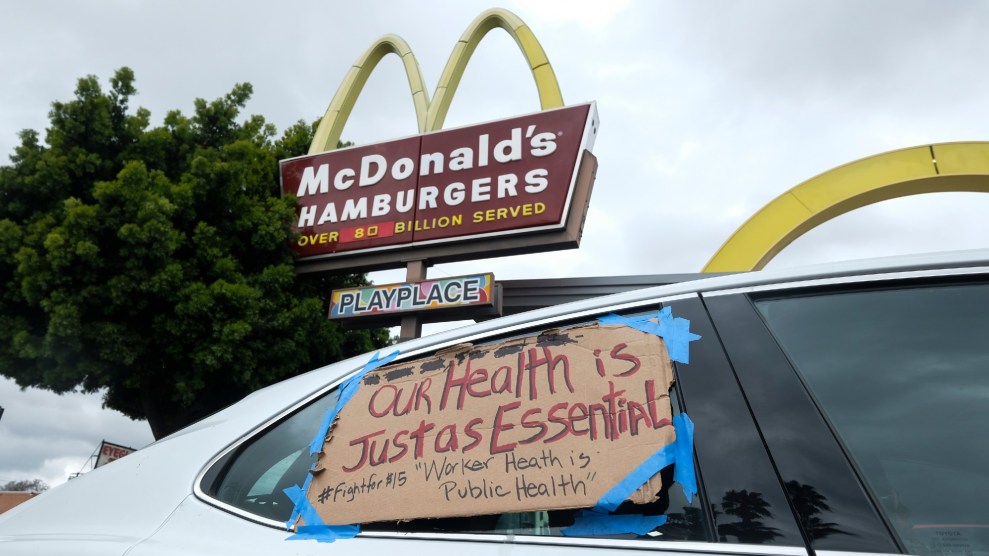
Demonstrators march to McDonald's headquarters on October 26, 2021, to protest the company's handling of sexual harassment.Scott Olson/Getty
L.H. worked for McDonald’s—or so she thought. The 14-year-old put on her McDonald’s uniform before her shifts, handed McDonald’s bags through the drive-through window, and, at the end of the day, trudged out through doors beside the golden arches.
But earlier this year, after her new manager started touching her inappropriately, told her he wanted her to be his “happy meal,” and then raped her in a restaurant bathroom, L.H. learned that technically, she didn’t work for McDonald’s at all, according to a legal complaint. Instead, she worked for Rice Enterprises—a franchisee that owns eight McDonald’s locations in the Pittsburgh, Pennsylvania, suburbs.
That seemingly technical distinction will matter immensely as the 14-year-old’s parents pursue a lawsuit accusing both Rice Enterprises and McDonald’s, the corporate entity, of negligence: for hiring the shift manager, Walter Garner, to oversee teen workers despite his past criminal conviction of sexual assault, for not adequately supervising him, and for failing to address complaints about harassment. According to the complaint, filed in September, even after L.H. (whose name has been concealed in court records because she is a minor) and her co-workers spoke to a hiring manager about Garner’s behavior, nothing was done to stop it; when other managers viewed surveillance video showing Garner groping L.H., they neither disciplined nor fired him. Only after he showed an intimate photo of her to another young worker, who reported it to her school, did anyone call the police, says Alan Perer, L.H.’s lawyer. Garner was arrested in mid-April and pleaded guilty this last week to statutory sexual assault of a girl age 11 or older, along with other charges.
L.H.’s ordeal is one of countless stories of workplace sexual harassment and violence at McDonald’s restaurants that have come to light over the last few years, as attorneys from the SEIU’s Fight for $15 campaign, Time’s Up, and the ACLU have filed and publicized dozens of complaints by workers. And in most of these cases, according to lawyers for McDonald’s workers, McDonald’s argues that it isn’t responsible, because the people at issue worked for franchises, not for corporate.
“They make all the profits, but they set themselves up to shield themselves from responsibility,” says Eve Cervantez, an employment lawyer representing many of the survivors. “That’s a huge problem with sexual harassment, and with respect to other workplace abuses.”
In October, McDonald’s workers outraged over L.H.’s story went on strike for a day. And on Tuesday, according to the Los Angeles Times, McDonald’s workers in five California cities will stage more walkouts and a series of rallies to shore up support for a bill that would make it clear that McDonald’s is on the hook for employment law violations in franchise restaurants, including sexual harassment. “The franchisee being a separate business from the franchisor—I think of it as a legal fiction,” says Lorena Gonzalez, the bill’s author. “We allow that to absolve the franchisor of their responsibility.”
Case in point, Perer says, are the strict rules franchisees must follow or risk losing their license. McDonald’s franchisees, for instance, may only use authorized technicians to fix the finicky ice cream machines they’re required to buy for their restaurants—a big reason the machines are often broken, making it hard to get your hands on a McFlurry. (As of this summer, the FTC was looking into restrictions on franchise owners fixing their own ice cream machines, according to the Wall Street Journal.)
When it comes to employees, McDonald’s franchise agreements dictate uniforms and hours of operation, require managers to attend the company’s “Hamburger University,” and allow corporate inspectors to keep a close eye on each restaurant. They also include “no-hire” clauses that prevent franchisees from poaching employees from a different McDonald’s. “They control everything down to how much ketchup goes on a burger at every McDonald’s in the world,” Perer says. “And yet, they say, ‘Well, we don’t have any control over how these issues [of sexual harassment] are managed.'”
When workers sue, they often cite these provisions to argue that both franchisees and corporate control their working conditions, and thus count as “joint employers” responsible for unpaid wages, discrimination, other harms. In turn, the big companies ask judges to let them off the hook, claiming they don’t meet the technical, legal definition of an employer. “They’re saying that they exercise no direct control over the employees, that they are essentially hands-off,” explains Andrele Brutus St. Val, an assistant professor at the University of Pittsburgh School of Law. “What these plaintiffs are saying, is, ‘Actually, no, you’re not. You regulate the employment conditions—through the standards that you set, through your handbooks.” And it’s not just McDonald’s: Companies like Taco Bell, Arby’s, and Dunkin’ Donuts fall back on the “joint employer” argument when facing suits.
Historically, the companies have won these court battles, according to Brutus St. Val, who recently published an analysis of McDonalds’ position on the “joint employer” question. In one major 2019 case, workers in the San Francisco Bay Area said McDonald’s and its franchisee had illegally withheld overtime pay, rest and meal breaks, and other benefits. The franchisee agreed to settle, but McDonald’s got itself dismissed from the case when both a federal judge and an appeals court panel agreed it didn’t meet the state law definition of an employer. In another California case from 2014, the state supreme court ruled that Domino’s Pizza wasn’t liable for a manager who sexually harassed an employee, because Domino’s didn’t qualify as an “employer” despite providing advice on training and firing decisions to the franchise owner. Even when the Labor Department, which sets the definition of a “joint employer,” broadened its definition during the Obama years, McDonald’s kept winning, Brutus St. Val says. (Trump administration later issued its own, stricter definition, which Biden’s Labor Department recently rolled back.)
As a result, McDonald’s has never been forced by a court to make systemic change—the change that’s clearly needed when 76 percent of female, non-managerial McDonald’s employees report experiencing workplace sexual harassment. “The reality is that McDonald’s is the only entity in this McDonald’s system that can affect every other entity in the system,” says Mary Joyce Carlson, a lawyer for the Fight for $15 campaign. “If McDonald’s wants to change something, they’re the only ones that can do that.” (Ninety-five percent of US McDonald’s locations are franchises, though workers at corporate-owned restaurants are also suing over claims that sexual harassment is condoned by management).
To date, McDonald’s has kept it optional for franchisees to use its sexual harassment model policy, training, posters, and other resources, according to Cervantez. But last April, following years of EEOC complaints, lawsuits, strikes, and bad press, McDonald’s announced that it would be implementing “required global standards for safe, respectful and inclusive workplaces.” Starting in January 2022, McDonald’s restaurants, including those owned by franchisees, will be “assessed and held accountable” under new, presumably mandatory standards “aimed at furthering a culture of physical and psychological safety for employees and customers through the prevention of violence, harassment and discrimination,” according to a corporate press release. No further details have been released yet. (In a statement to Mother Jones, a McDonald’s representative wrote that “Sexual harassment in the workplace is an affront to everything we stand for as a System” but did not provide specifics or answer further questions.)
To lawyers for the workers, this just shows that McDonald’s has always had the authority to control the very working conditions that contributed to their clients being harassed. “They always could determine the standards, and the requirements, and the policies, the sexual abuse and harassment policies, in all their stores,” Perer says. “And the fact that they didn’t was just their way of trying to avoid legal responsibility.” It’s possible the new rules will bolster workers’ argument that McDonald’s has enough control over working conditions to qualify as a “joint employer.” If so, Brutus St. Val speculates, it could lead to more lawsuits, and likely, more settlements. “But what you could also see,” she adds, “is that if they are found to be joint employers, McDonald’s would then have a reason to act in the best interest of the employees.”
There’s some evidence the tide may be shifting, as attorneys for the ACLU Women’s Rights Project recently pointed out in a Fortune op-ed. This June, a federal court in Missouri rejected a McDonald’s bid to dismiss one lawsuit by a franchise worker on the basis that it wasn’t her “joint employer.” In that case, a teenager alleged that a shift manager had groped her and—along with another co-worker—made sexually explicit comments, and that the store’s general manager failed to intervene, forcing her to quit within weeks of starting her new job. Last month, a shareholder lawsuit from a McDonald’s investor alleged that the company’s board “improperly abdicated its oversight of franchises” despite knowing of “widespread sexual harassment. (That lawsuit also claims the board mishandled the 2019 firing of former McDonald’s CEO Steve Easterbrook, who allegedly sexted a subordinate and had relationships with three others, yet received a $40 million exit package).
And then there’s the bill in California, which could transform fast-food companies’ liability in the state—if it can overcome the influence of corporate lobbying. (Last month, the president of the International Franchise Association warned a Los Angeles Times reporter that if the bill were to pass, some big franchisers would no longer license new locations in California.) The bill would create a “fast food sector council” to set minimum standards for wages, hours, training, and other working conditions, which could include sexual harassment. And it would sidestep the disputes about who technically counts as an employer by making fast-food companies jointly liable when their franchisees violate the new standards set by the council, as well as a range of existing labor laws, health and safety regulations, and local orders. While the bill failed by two votes in the Assembly last June, Gonzalez says she will revive it in January.
Gonzalez hopes the walkout on Tuesday will remind fellow lawmakers that they’re accountable to the fast-food workers in their districts, not just to business interests. And if her bill succeeds, those workers will get powerful new representation on its fast-food sector council, which would include employees and their advocates alongside state bureaucrats and industry delegates. “We’re trying to create a model where fast-food workers and their representatives have an ability to change their workplace procedures the same you would if they had a union contract,” Gonzalez says.
In this way, it would provide the kind of opportunity for worker input that lawyers for the McDonald’s harassment survivors say is desperately needed in whatever new anti-harassment initiatives McDonald’s rolls out in January. “What anybody who tries to change culture will tell you is that a new program, a new approach, in this area, of all areas, has to be worker-centered,” Carlson says. “They should have input, they should be able to say, ‘This is what happened to us. This is why we think it happened. This is a change that we think could prevent it from happening again. And we want to be a part of that change.'”
This article has been updated.
















